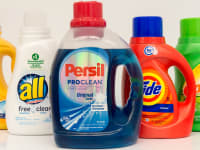You should probably be using less laundry detergent
Bad news: Too much detergent makes your clothes dirtier
Products are chosen independently by our editors. Purchases made through our links may earn us a commission.
It might sound counterintuitive, but using too much detergent will actually leave your laundry dirty. This happens because the base components of detergent work in specific concentrations. When those concentrations are too high, bad laundry mishaps can occur.
The dirty truth about detergent
The exact makeup of detergent varies from brand to brand, but the basic molecular structure remains the same. Soap molecules need to be amphiphilic, meaning they have both a "dirt-loving" and a "water-loving" end. The dirt-loving end, which also repels water, is typically made of lipids—the building blocks of fats. This is why detergents and soaps feel greasy. This end anchors itself onto stains.
When your washing machine spins and rinses, the water-loving end wants to go with the flow, yanking bits of the stain along with it. Using soap effectively requires water and mechanical action. Think of soap as a shovel and your arms as water. If you don't move your arms the shovel serves no purpose.
When soap clings to your clothes, the easiest way to get it out is by running water through it. However, washing machines are designed on the assumption that you're going to use the recommended amount of detergent. If you don't have enough water or spin, your clothes are going to come out visibly caked in soap or feeling greasy.
This happens a lot with the Delicates cycle. People use the same amount of detergent as the Normal cycle, but the Delicates cycle doesn't spin as much so the soap molecules aren't pried away, leaving clothes feeling greasy.
Foaming and suds in the drum
The fact of the matter is, the more detergent you use, the more suds there will be.
Newer washing machines will have sensors that check for any remaining dirt in the suds. Smart washers have programming that makes the assumption that you used the correct amount of detergent.
If you use too much detergent, then you'll get too many suds. These extra suds won't pick up any dirt and will obscure the fact there are more stains to be removed. When the sensors see only clean suds then the machine will think that the wash is done, prematurely ending the cycle.
Using too much detergent can damage your washer, too. Detergent that doesn't get washed away dries up as residue inside your machine. Repeated overuse of detergent causes residue to build up, which eventually leads to blockages. In turn, these blockages force water to back up into places where it shouldn't be, like the control panel or your floor. More importantly, when your washer breaks down you can't wash your clothes effectively, so they stay dirty.
So how much detergent should I use?
A good place to start is with the instructions on the detergent bottles as this will have the best guidance specific to whichever detergent you’re using. Beyond that, we recommend for a normal load of laundry, never fill the cap up more than a third of the way. On heavier loads, up to half way on the cap should do.
There are also washing machines that offer automatic detergent dispensing. For example, the Maytag MHW8630HC holds up to 8 loads of detergent at a time and will automatically dispense the right amount for every load.
We should also state, the best way to use less detergent and get cleaner laundry is to pretreat stains. Cold water is the quickest pretreating tool. Water keeps stains from settling into fibers, and the cold temperature prevents substances like protein from "cooking" onto your shirts.
There's also a variety of stain removers and pretreatment sprays you can buy to limit the volume of detergent you'll need for each load.
When in doubt about how much detergent to use, remember that less is more.
The product experts at Reviewed have all your shopping needs covered. Follow Reviewed on Facebook, Twitter, and Instagram for the latest deals, product reviews, and more.
Prices were accurate at the time this article was published but may change over time.


